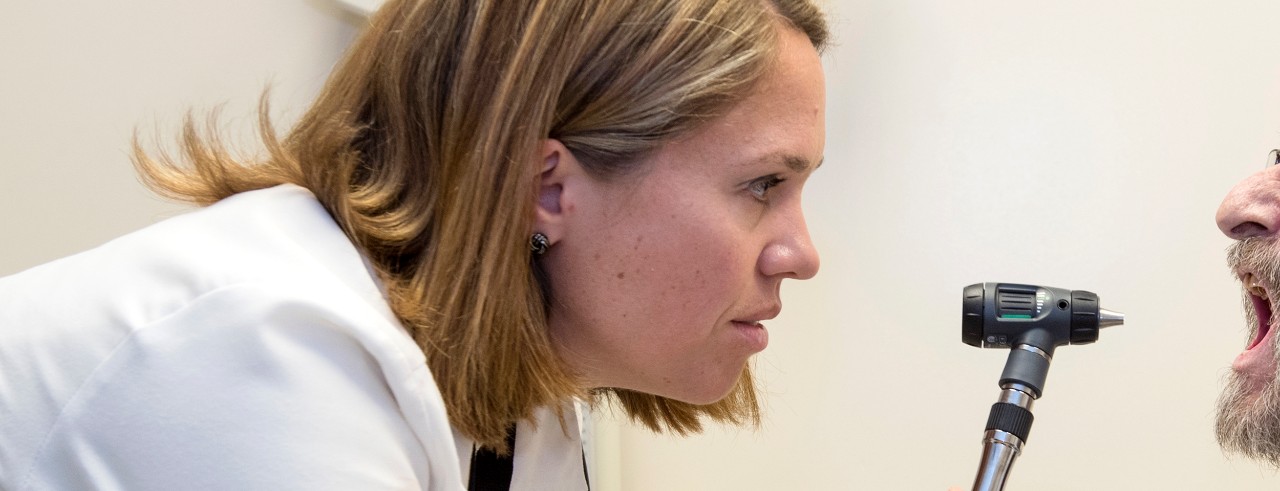
UC Cancer Center leads COVID-19 studies
UC joins national consortium, collecting data on cancer patients with COVID-19
The University of Cincinnati Cancer Center is joining the international hunt to uncover knowledge about the coronavirus.
The UC center will focus on an area it is far too familiar with: patients with cancer.
Researchers across the globe are trying to comprehend COVID-19 and how the virus affects all kinds of people — including those who are immunocompromised.
UC is joining a consortium of 100 cancer centers and other organizations to collect data about patients with cancer who have been infected with COVID-19 and to make available information about this especially vulnerable population.
Dr. Trisha Wise-Draper, associate professor of medicine at the UC College of Medicine, UC Health oncologist and medical director of the UC Cancer Center’s Clinical Trials Office, is overseeing the local arm of the study, called CCC19.
“As part of this consortium, we are able to join colleagues from around the world to better understand the unique effects of COVID-19 on patients with cancer, including those with a history of cancer,” she says. “Through this pooling of data, researchers are anticipating a rapid accumulation of knowledge which will help with studies and trials moving forward and could help with additional funding and publication opportunities for researchers involved.”

Dr. Trisha Wise-Draper, associate professor of medicine at the UC College of Medicine, UC Health oncologist and medical director of the UC Cancer Center’s Clinical Trials Office, says UC is participating in two clinical trials to examine COVID-19 in patient populations with cancer. She's pictured here with Dr. Vinita Takiar. Photo/Colleen Kelley/UC Creative + Brand
UC is joining cancer centers like Vanderbilt-Ingram Cancer Center, Moffitt Cancer Center, Mayo Clinic Cancer Center as well as national organizations like the American Society of Clinical Oncology and more.
Wise-Draper says that participating institutions will try to identify and report all cases of COVID-19 in patients with a current or prior history of cancer, not just those who are critically ill.
“In order to fully understand this pandemic, we need to capture data on relatively asymptomatic outpatients as well as those heavily affected by the disease,” she says.
The UC Cancer Center’s Clinical Trials Office will work closely with the UC/UC Health COVID-19 Innovation Committee to avoid duplicated data entry. The consortium is requesting data on 30-day and 90-day outcomes.
Wise-Draper says as of last week, nationally, just under 1,000 patients were enrolled in the study.
Additionally, she and researchers at the UC Cancer Center are participating in another study, using blood samples from patients with cancer taken from the UC COVID-19 biorepository, to examine how certain therapies may impact outcomes for patients with COVID-19 and those with both cancer and the coronavirus.
These studies are very important and could greatly help patients with cancer, patients with COVID-19 and patients with both.
Dr. Trisha Wise-Draper
“As part of our study, COVID-ICI, we are examining how immune checkpoint inhibitors, drugs that allow immune cells to respond more strongly, in combination with other treatments, like chemotherapy or radiation, affect the immune cells of COVID-19 patients and patients with both COVID-19 and cancer,” she says. “We think that using these drugs in cancer patients with the virus will lead to an increased inflammatory immune response in comparison to those not receiving these drugs, and that maybe using drugs like metformin, an anti-diabetic drug that has been studied for use in certain cancer populations, in combination might be a better option.”
She says the study may help determine treatment plans for patients with cancer and uncover new alternatives for COVID-19 patients.
“It will help us understand if this type of therapy prevents infection, or if on the other hand, therapy should be postponed in cancer patients already infected with COVID-19 to prevent complications, and at the same time, possibly uncover an alternative treatment for COVID-19 in both cancer and noncancer patients,” Wise-Draper adds.
“These studies are very important and could greatly help patients with cancer, patients with COVID-19 and patients with both,” she says. “We’re excited to be able to help shed light on something that is impacting all of us and could truly save lives.”
Featured photo of Trisha Wise-Draper. Photo/Colleen Kelley/UC Creative + Brand
Impact Lives Here
The University of Cincinnati is leading public urban universities into a new era of innovation and impact. Our faculty, staff and students are saving lives, changing outcomes and bending the future in our city's direction. Next Lives Here.
Stay up on all UC's COVID-19 stories, read more #UCtheGood content, or take a UC virtual visit and begin picturing yourself at an institution that inspires incredible stories.
Related Stories
Designing Access
February 17, 2026
Faculty-led collaboration brings typography, wayfinding and public input to transit infrastructure.
Get ready for your next job with a NEXT Mindset
February 17, 2026
University of Cincinnati students will discover how to prepare themselves for the workplace during the NEXT Mindset Professional Readiness Day on Feb. 24 at the 1819 Innovation Hub.
UC professor curates Little Women exhibition to accompany Playhouse in the Park production
February 16, 2026
The exhibition traces how artists shaped the visual legacy of Alcott’s beloved novel.
